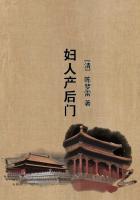Hammond went on: "When you get down to the Thames side you come on the Docks, which are works of the nineteenth century, and are still in use, although not so thronged as they once were, since we discourage centralisaion all we can, and we have long ago dropped the pretension to be the market of the world. About these Docks are a good few houses, which, however, are not inhabited by many people permanently;I mean, those who use them come and go a good deal, the place being too low and marshy for pleasant dwelling. Past the Docks eastward and landward it is all flat pasture, once marsh, except for a few gardens, and there are very few permanent dwellings there: scarcely anything but a few sheds, and cots for the men who come to look after the great herds of cattle pasturing there. But however, what with the beasts and the men, and the scattered red-tiled roofs and the big hayricks, it does not make a bad holiday to get a quiet pony and ride about there on a sunny afternoon of autumn, and look over the river and the craft passing up and down, and on to Shooter s' Hill and the Kentish uplands, and then turn round to the wide green sea of the Essex marshland, with the great domed line of the sky, and the sun shining down in one flood of peaceful light over the long distance. There is a place called Canning's Town, and further out, Silvertown, where the pleasant meadows are at their pleasantest: doubtless they were once slums, and wretched enough."The names grated on my ear, but I could not explain why to him. So Isaid: "And south of the river, what is it like?"He said: "You would find it much the same as the land about Hammersmith. North, again, the land runs up high, and there is an agreeable and well-built town called Hampstead, which fitly ends London on that side. It looks down on the north-western end of the forest you passed through."I smiled. "So much for what was once London," said I. "Now tell me about the other towns of the country."He said: "As to the big murky places which were once, as we know, the centres of manufacture, they have, like the brick and mortar desert of London, disappeared; only, since they were the centres of nothing but `manufacture', and served no purpose but that of the gambling market, they have left less signs of their existence than London. Of course, the great change in the use of mechanical force made this an easy matter, and some approach to their break-up as centres would probably have taken place, even if we had not changed our habits so much: but they being such as they were, no sacrifice would have seemed too great a price to pay for getting rid of the `manufacturing districts', as they used to be called. For the rest, whatever coal or mineral we need is brought to grass and sent whither it is needed with as little as possible of dirt, confusion, and the distressing of quiet people's lives. One is tempted to believe from what one has read of the condition of those districts in the nineteenth century, that those who had them under their power worried, befouled, and degraded men out of malice prepense: but it was not so; like the miseducation of which we were talking just now, it came of their dreadful poverty. They were obliged to put up with everything, and even pretend that they liked it; whereas we can now deal with things reasonable, and refuse to be saddled with what we do not want."I confess I was not sorry to cut short with a question his glorifications of the age he lived in. Said I: "How about the smaller towns? I suppose you have swept those away entirely?""No, no," said he, "it hasn't gone that way. On the contrary, there has been but little clearance, though much rebuilding in the smaller towns. Their suburbs, indeed, when they had any, have melted away into the general country, and space and elbow-room has been got in their centres: but there are the towns still with their streets and squares the market-places; so that it is by means of these smaller towns that we of to-day can get some kind of idea of what the towns of the older world were like;--I mean to say at their best.""Take Oxford, for instance," said I.
"Yes," said he, "I suppose Oxford was beautiful even in the nineteenth century. At present it has the great interest of still preserving a great mass of precommercial building, and is a very beautiful place, yet there are many towns which have become scarcely less beautiful."Said I: "In passing, may I ask if it is still a place of learning?""Still?" said he, smiling. "Well, it has reverted to some of its best traditions; so you may imagine how far it is from its nineteenth-century position. It is real learning, knowledge cultivated for its own sake--the Art of Knowledge, in short--which is followed there, not the Commercial learning of the past. Though perhaps you do not know that in the nineteenth century Oxford and its less interesting sister Cambridge became definitely commercial. They (and especially Oxford) were the breeding places of a peculiar class of parasites, who called themselves cultivated people; they were indeed cynical enough, as the so-called educated classes of the day generally were; but they affected an exaggeration of cynicism in order that they might be thought knowing and worldly-wise. The rich middle classes (they had no relation with the working-classes) treated them with the kind of contemptuous toleration with which a mediaeval baron treated his jester; though it must be said that they were by no means so pleasant as the old jesters were, being, in fact, _the_ bores of society. They were laughed at, despised--and paid. Which last was what they aimed at."Dear me! thought I, how apt history is to reverse contemporary judgements. Surely only the worst of them were as bad as that. But Imust admit that they were mostly prigs, and they _were_ commercial. Isaid aloud, though more to myself than to Hammond, "Well, how could they be better than the age that made them?""True," he said, "but their pretensions were higher.""Were they?" said I, smiling.













